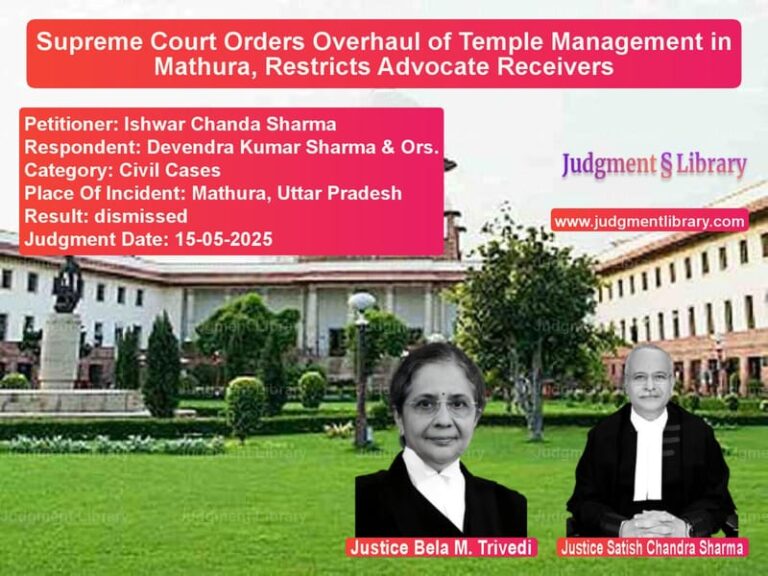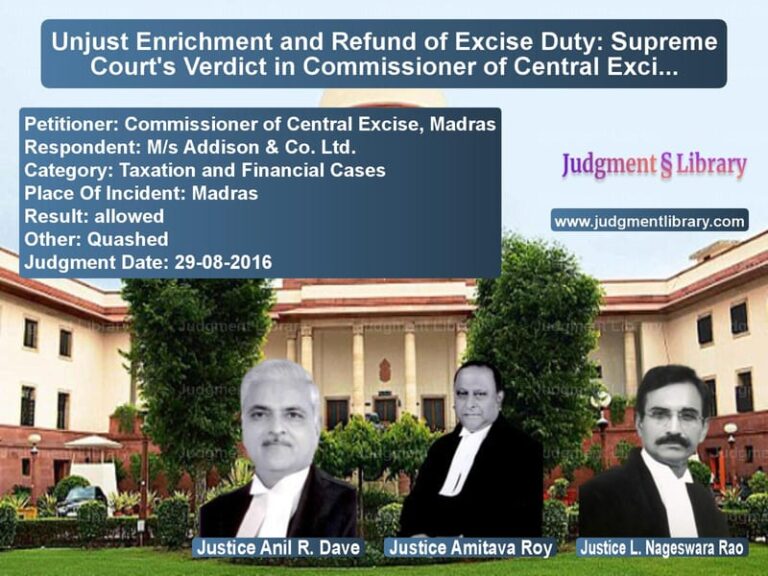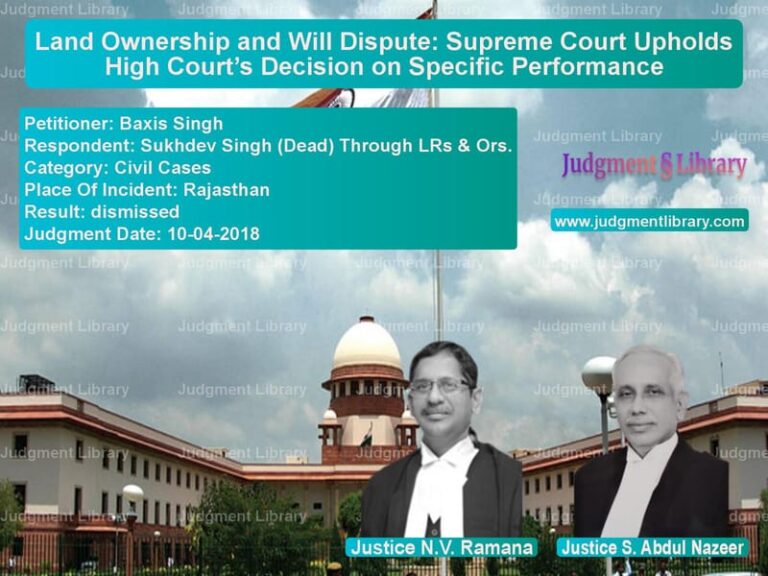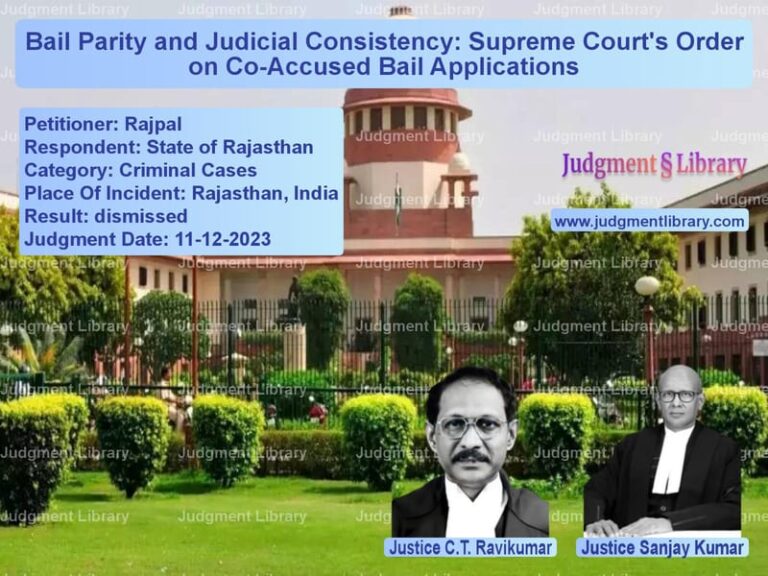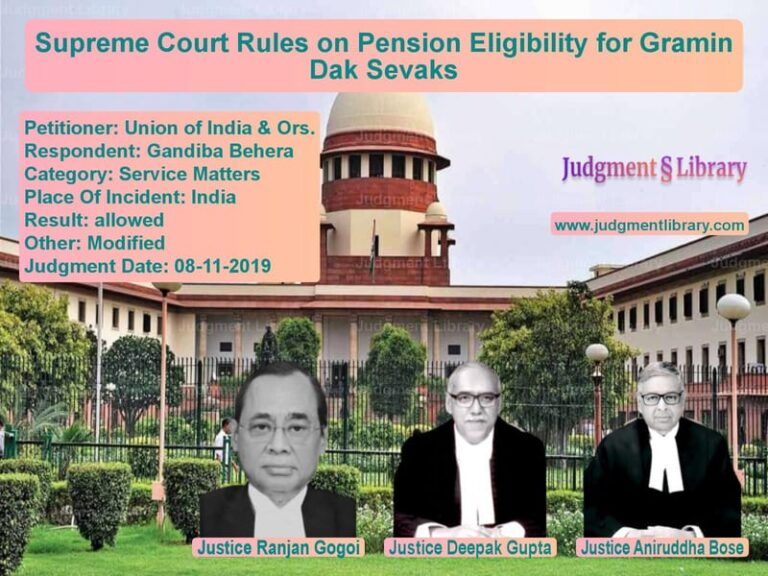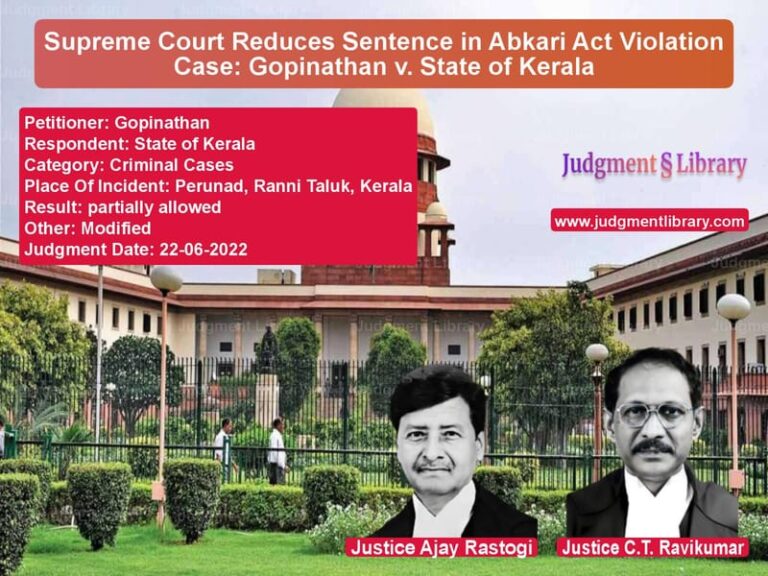Analysis of Section 47A of the Indian Stamp Act: Ruling in Inspector General of Registration vs. K. Baskaran
The case of Inspector General of Registration, Tamil Nadu vs K. Baskaran revolves around the interpretation of Section 47-A of the Indian Stamp Act, 1899, and its application in property valuation for stamp duty. The case touches upon crucial aspects of how undervaluation of properties in sale deeds can lead to the revision of stamp duty and whether the Collector’s powers in such cases extend to reassessing the market value post-sale. This case has significant implications for property transactions and the assessment of stamp duty in India.
The issue arises from the sale of properties where the market value of the property was found to be understated in the sale deeds. The Inspector General of Registration in Tamil Nadu, acting through the subordinate authorities, identified discrepancies in the property’s valuation and referred the case to the Collector for reassessment. The appeal arises from the Collector’s final valuation and the correctness of the delegation of powers under the relevant statutory rules governing stamp duty valuation.
Background: K. Baskaran, the respondent, had purchased two properties in Tamil Nadu, and the sale deeds under which these properties were bought reflected a significantly lower market value than what the properties were worth. When the sale deeds were presented for registration, the Sub-Registrar noticed the undervaluation and referred the matter to the Collector for an assessment of the correct market value. The Collector issued provisional notices regarding the reassessed market value, leading to a demand for additional stamp duty. The respondent, K. Baskaran, challenged this reassessment in court, leading to the present appeal.
Legal Framework
The case revolves around Section 47A of the Indian Stamp Act, which empowers the State Government to regulate the process of determining market value in relation to stamp duty. The Act aims to ensure that properties are accurately valued for the purpose of taxation, and that stamp duty is appropriately assessed. The Tamil Nadu Stamp (Prevention of Undervaluation of Instruments) Rules, 1968, provide further guidance on how the authorities should handle such cases.
The principal legal issue is whether the Collector, upon identifying undervaluation, has the authority to reassess the property’s market value and demand additional stamp duty. A further question concerns the timeline for issuing such reassessments, especially in cases where property transactions were completed long before the reassessment took place.
Arguments of the Petitioner (Inspector General of Registration)
The petitioner, represented by the Inspector General of Registration, argued the following points:
- The Collector has the authority under Section 47A to determine the market value of property and demand additional stamp duty if the sale deed is undervalued.
- The delegation of powers for the assessment of market value to the authorities and their subsequent decisions are in accordance with the provisions of the Indian Stamp Act and the Tamil Nadu Stamp Rules.
- The assessment of the market value by the Sub-Registrar and the subsequent revision by the Collector is a part of the process of ensuring that stamp duty is collected fairly based on the true market value of properties.
- In this case, the market value had been incorrectly stated in the sale deeds, and the reassessment was necessary to ensure compliance with the legal requirements of the Stamp Act.
Arguments of the Respondent (K. Baskaran)
The respondent, K. Baskaran, presented the following counterarguments:
- The reassessment by the Collector was not justified as the sale deeds had already been registered, and the respondent had paid the stamp duty based on the value stated in the deeds.
- Section 47A of the Indian Stamp Act applies only to cases where the property’s market value is assessed before the sale, and it does not empower the Collector to reassess the value post-sale for the purposes of additional tax liability.
- The rules regarding the timely assessment of market value under the Tamil Nadu Stamp Rules were not followed, and the delay in reassessment violated the principles of fairness in property transactions.
- The reassessment was not within the jurisdiction of the Collector, as there was no valid reason to challenge the original valuation at the time of registration.
Judgment of the Supreme Court
The Supreme Court addressed the issue of the Collector’s authority under Section 47A of the Indian Stamp Act and the procedural validity of the reassessment of market value. The Court held:
- The Collector has the legal authority to reassess the market value of properties for stamp duty purposes if the valuation is found to be understated.
- The Court emphasized that the prevention of undervaluation was a key objective of the Indian Stamp Act and that the authorities were well within their rights to ensure that the correct market value was applied for the purpose of tax collection.
- The Court upheld the argument that the reassessment was justified under Section 47A and did not violate any statutory provisions. The Court also highlighted the importance of protecting public revenue through proper property valuation and the assessment of stamp duty.
- The timeline for reassessment was discussed in the context of the Tamil Nadu Stamp Rules. While the Court noted that prompt action was essential, it found that the delay in reassessment did not necessarily invalidate the process, provided no prejudice was caused to the parties involved.
- The Supreme Court concluded that the appeal against the reassessment by the Collector should be dismissed, as the action taken was consistent with the legal framework and was necessary to uphold the integrity of the stamp duty process.
Impact of the Judgment
The judgment has far-reaching implications for property transactions in India, particularly with regard to the collection of stamp duty and the valuation of properties:
- The Court affirmed the authority of the Collector under Section 47A to reassess property valuations and demand additional stamp duty in cases of undervaluation.
- The decision emphasizes the importance of accurate property valuations and the need for authorities to uphold the integrity of the stamp duty collection process.
- The ruling also clarified the procedural aspects of reassessing market value, ensuring that authorities act within the framework of the law while protecting the interests of property buyers and sellers.
- This case sets a precedent for future disputes over undervaluation in property transactions, ensuring that the tax liability is fairly and correctly determined based on the actual market value.
Conclusion
The judgment in Inspector General of Registration, Tamil Nadu vs K. Baskaran addresses the complexities involved in property valuations for stamp duty purposes and highlights the role of the Collector in reassessing property values. By upholding the authority of the Collector and emphasizing the importance of accurate valuations, the Supreme Court has reinforced the principles of fairness in property taxation. The ruling will serve as a guiding precedent for future cases related to property transactions and stamp duty assessments.
Petitioner Name: Inspector General of Registration, Tamil Nadu.Respondent Name: K. Baskaran.Judgment By: Justice R. Banumathi, Justice Indira Banerjee, Justice Aniruddha Bose.Place Of Incident: Tamil Nadu, India.Judgment Date: 18-06-2020.
Don’t miss out on the full details! Download the complete judgment in PDF format below and gain valuable insights instantly!
Download Judgment: Inspector General of vs K. Baskaran Supreme Court of India Judgment Dated 18-06-2020.pdf
Direct Downlaod Judgment: Direct downlaod this Judgment
See all petitions in Income Tax Disputes
See all petitions in Property Disputes
See all petitions in Tax Evasion Cases
See all petitions in Commercial Arbitration
See all petitions in Judgment by R. Banumathi
See all petitions in Judgment by Indira Banerjee
See all petitions in Judgment by Aniruddha Bose
See all petitions in dismissed
See all petitions in supreme court of India judgments June 2020
See all petitions in 2020 judgments
See all posts in Taxation and Financial Cases Category
See all allowed petitions in Taxation and Financial Cases Category
See all Dismissed petitions in Taxation and Financial Cases Category
See all partially allowed petitions in Taxation and Financial Cases Category


